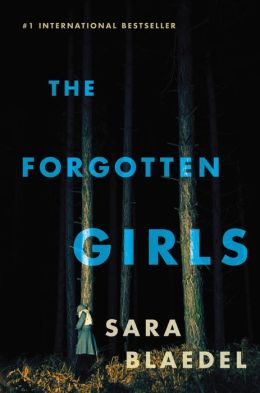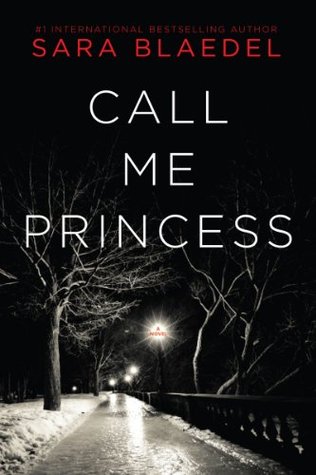From The Booking Desk:
I am pleased to welcome Sara Blaedel to BOLO Books! One of the most popular novelists in Denmark, Sara’s latest book, The Forgotten Girls, in being released in the US today.
You can find the BOLO Books spoiler-free review of Sara Blaedel’s The Forgotten Girls here.
BOLO Books: Tell us a bit about Louise Rick and where she is in her life at the beginning of The Forgotten Girls.
 Sara Blaedel: As The Forgotten Girls opens, Louise has just been appointed as technical manager of the Special Search Agency under the Search Department with the National Police. (Each year, 1600-1700 people are reported missing in Denmark. Many turn up on their own, some are found dead of natural causes and some remain missing. According to an assessment by the National Police, there is a crime behind approximately five of the unsolved missing person reports each year. These are the cases that Louise Rick’s department has been charged with unearthing and investigating.)
Sara Blaedel: As The Forgotten Girls opens, Louise has just been appointed as technical manager of the Special Search Agency under the Search Department with the National Police. (Each year, 1600-1700 people are reported missing in Denmark. Many turn up on their own, some are found dead of natural causes and some remain missing. According to an assessment by the National Police, there is a crime behind approximately five of the unsolved missing person reports each year. These are the cases that Louise Rick’s department has been charged with unearthing and investigating.)
Louise also gets a new colleague Eik Nordstrom, and we are already in the very beginning getting to feel that it will be relationship with a lot of tension.
BOLO Books: Like the Magdalene Laundries, the conditions within these institutions for Forgotten Children must have come as quite a shock to the Danish people. What made you decide to include that history in your story and what was the most shocking thing you discovered in your research?
 Sara Blaedel: Over the years I have looked at topics like prostitution, Internet dating, drug abuse, peer pressure, assisted suicide and much more. In The Forgotten Girls that will be published in the US on the 3rd of February by Grand Central Publishing the story takes place in the historical setting of an all-girls home where unwanted girls were abandoned.
Sara Blaedel: Over the years I have looked at topics like prostitution, Internet dating, drug abuse, peer pressure, assisted suicide and much more. In The Forgotten Girls that will be published in the US on the 3rd of February by Grand Central Publishing the story takes place in the historical setting of an all-girls home where unwanted girls were abandoned.
50 years ago, it was custom for local authorities to look after children that for one reason or another could not get the care they were entitled to from their own families. When the girls registered at the orphanage, parents were asked to forget that they ever existed. Two of these girls, a pair of twins, appear many years later, many years after everybody thought they were dead. I read about these forgotten children in a Danish newspaper, and the story just would not leave me. It made me really curious.
BOLO Books: For those readers who have not heard you speak before, tell us a bit about the state of crime in Denmark. What crimes are most common?
Sara Blaedel: The most common crime I Denmark are burglary and theft – not very “exotic”, but very characteristic for most countries in the World, I guess. For those of us who write crime fiction, burglary and theft are not the most interesting. If you made statistics on the crime in crime fiction, the picture would be completely different and much more terrifying.
BOLO Books: Louise Rick has had a very distinguished career. Is it common for women to rise to this level of success in her profession? Because law enforcement is such a male dominated field, do women face the same challenges in Denmark they do here in the States?
Sara Blaedel: I don’t know for sure. But yes, women in Denmark can definitely rise to Louise’s level of success in the police force. Not many years ago the head of Danish National Police was a woman. In Denmark 74% of the police force are men, and 26% women. And of course there are still differences in career and sex, but I think that we in Denmark are very attentive to try to even out the difference. But having said that, there are the biological differences between women and men, which obviously have an impact on career options and choices.
BOLO Books: Louise’s friendship with the journalist Camilla Lund is central to the series. They have a very strong bond, and yet they have to set some boundaries because of their conflicting careers. Compare and contrast these two women for readers unfamiliar with your series.
 Sara Blaedel: Louise Rick and Camilla Lind are one another’s family by choice. We follow them at work (police and reporter) and we learn about their sons and spouses. We follow them through Copenhagen and through the suburbs where they both grew up (as did I myself) out in the countryside – 50 kilometers away from Copenhagen. An area with large forests, fjords and villages. An area with an ancient old history and a thousand-year-old mythology. We get to follow police work, and we get close to how media works. And we get close to them solving crimes in this setting, way up close. Knowing how actual police work takes place is important to me and doing research on the factual elements of my stories has top priority when I write. Being a journalist myself I’m able to give firsthand knowledge of that profession and how they think and work in the media business.
Sara Blaedel: Louise Rick and Camilla Lind are one another’s family by choice. We follow them at work (police and reporter) and we learn about their sons and spouses. We follow them through Copenhagen and through the suburbs where they both grew up (as did I myself) out in the countryside – 50 kilometers away from Copenhagen. An area with large forests, fjords and villages. An area with an ancient old history and a thousand-year-old mythology. We get to follow police work, and we get close to how media works. And we get close to them solving crimes in this setting, way up close. Knowing how actual police work takes place is important to me and doing research on the factual elements of my stories has top priority when I write. Being a journalist myself I’m able to give firsthand knowledge of that profession and how they think and work in the media business.
Louise and Camilla are alike in some ways and very different in others. They share a passion for their work, and they both have a great desire to get to the bottom of things. Louise is a much more complicated person than Camilla. Louise is stubborn, verging on being opinionated. It is not easy for her to bond with other people, especially in her love life, and she often finds it difficult to separate her professional life from her personal life. Camilla, on the other hand, is open to love and has probably a more straightforward emotional life. Camilla is strong and direct, where Louise is probably more introvert and ruled by her emotions.
BOLO Books: Whenever I read a book that has been translated, I always wonder how close it remains to the original text. Often, the writing can feel stilted and unnatural. In the case of The Forgotten Girls, this was never the case. Were you happy with the translation of this novel?
Sara Blaedel: Oh yes, I am very happy with the translation. Both the translator and my American editor have done a fantastic job.
BOLO Books: Are Danish readers reading American crime fiction? Who are some of their favorites?
Sara Blaedel: Yes, Danish readers love American crime fiction. Karin Slaughter, Michael Connelly, Don Winslow, James Lee Burke, Patricia Cornwell, Elizabeth George, James Ellroy, James Patterson and of course the all time classics like Raymond Chandler etc.
 BOLO Books: You suffer from dyslexia and yet, as a child found that it was pleasurable to escape into the world of books. This is a common thing for introverted youth to do, but not so often with dyslexia sufferers. How did these two things (dyslexia and introversion) lead you to your ultimate path in life?
BOLO Books: You suffer from dyslexia and yet, as a child found that it was pleasurable to escape into the world of books. This is a common thing for introverted youth to do, but not so often with dyslexia sufferers. How did these two things (dyslexia and introversion) lead you to your ultimate path in life?
Sara Blaedel: I have always had a passionate relationship with crime literature ever since I was a child and my mother told me stories, ever since I started reading Enid Blyton’s Famous Five, and ever since I found out that I was pretty good at imagining things. Nature equipped me with a terrible curiosity; a murderous fantasy, empathy and a desire to investigate human relationships, especially when they go awry, or when there is more at stake than the color of wallpaper. In other words, on the one hand it was meant to be that I would go on to write crime fiction, but on the other hand, it didn’t seem like something I would go on to do for several reasons, among them dyslexia. Books and stories were a natural and important part of my childhood – my mother was an actress and my father a journalist. I think that my parents gave me the will and courage to believe in myself.
BOLO Books: You have been named Denmark’s most popular novelist on several occasions. What are some of the differences you find between promotion in your native country and in other locations?
Sara Blaedel: Well, I live in my native country. I am here most of the time and available for interviews and performances. I am a live talk show host on my own Nordic Noir-soiree. It is easier to increase visibility where you live and stay most of the time. And cultures are different. You do things in different ways. But I think it is very beautiful in a way, that in most countries the readers are interested in the same things in my books and in relation to me as a writer.
BOLO Books: Have the novels in this series been released in order here in the States? And what can we look forward to next? There is a major development in Louise’s history that is uncovered in The Forgotten Girls and it seems as though that may be the focus on the next novel. Correct?
Sara Blaedel: It will be a new and exciting start with my new publisher Grand Central Publishing. They are amazing and wonderful to work with. We launch The Forgotten Girls, and about a year from now, we expect the sequel to be published – it is called Killing Forest. I am looking forward to finding out if the American readers will like my books. I hope so!
BOLO Books: If forced to choose only one format for all your future reading, which would you choose: Hardback, trade paperback, mass-market paperback, or e-book? And why?
Sara Blaedel: HA! That’s a hard one. I read a lot of e-books, but my heart belongs to the p-book – in all formats.
